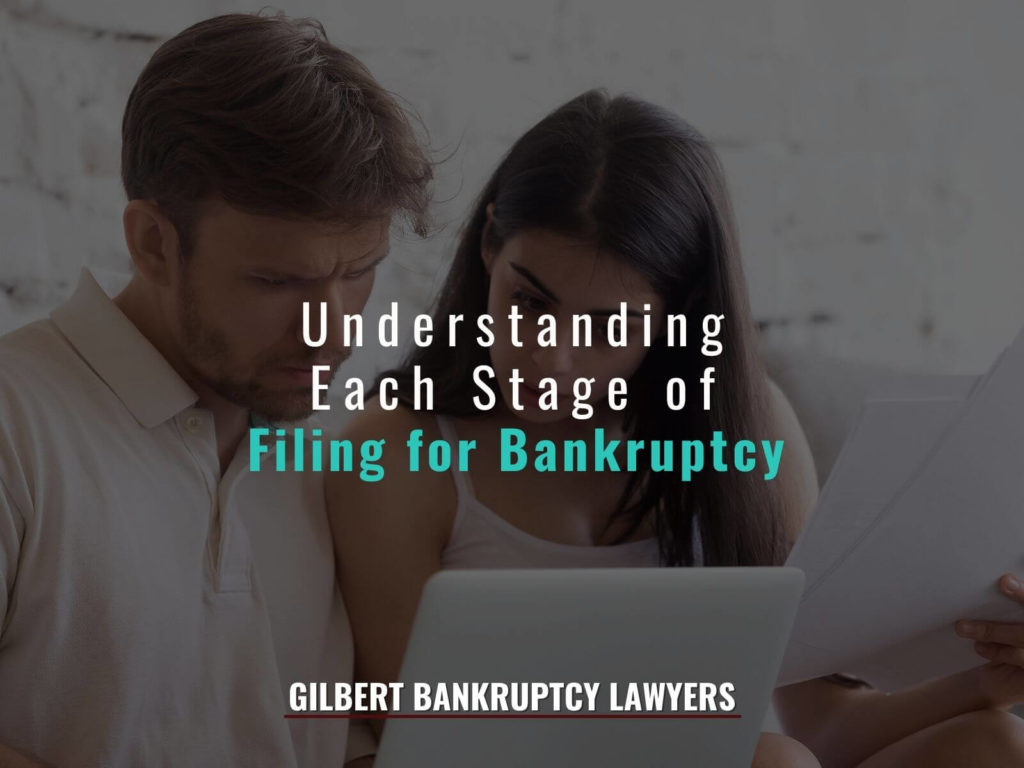Understanding Each Stage of Filing for Bankruptcy
Gilbert Bankruptcy Lawyers Explain About The 6 Steps in a Bankruptcy Process
A lot of stigma and misinformation persists about bankruptcy that keeps many people from getting the debt relief they sorely need. Part of the reason for the misinformation is that most people don’t have personal experience with bankruptcy. Most people file once, and they don’t tend to talk about the details. So, if you haven’t filed for bankruptcy yourself, or you don’t have a close friend who filed and was willing to talk about it with you, you are unlikely to know what the process is like and you might have unreliable information filling in the gaps.
The best thing you can do to learn about bankruptcy and its benefits is to talk with a bankruptcy attorney in Gilbert. However, learning a little about the process can help you better understand its benefits, as well as help you have a more informed conversation with your Gilbert bankruptcy lawyer. Here’s a quick look at the stages of bankruptcy to help you understand it better:
Pre-Filing Counseling
Before you can file for bankruptcy, you have to meet with an approved credit counselor. The meeting will last for an hour or two, and in it, the counselor will talk to you about your finances, help you create a personal budget, and review your options through bankruptcy.
You must have this counseling meeting within six months of filing for bankruptcy. Your Gilbert bankruptcy attorney can recommend a counselor to complete this step.
Filing the Petition
After you complete this counseling, you are ready to file your bankruptcy petition. Your bankruptcy attorney serving Gilbert will create and file the petition after meeting with you and reviewing all your personal finances. You will need to provide many documents and answer many questions so your attorney will have all the information needed to create a complete petition.
The Automatic Stay
Once your bankruptcy attorney files the bankruptcy petition, an automatic stay is issued that prevents your creditors from contacting you or taking any other actions to collect on your debts. If your creditors have begun any legal action against you, such as collections or a lawsuit, these proceedings will be halted until a resolution can be reached with your bankruptcy.
If your creditors contact you after the automatic stay is issued, direct them to contact your Gilbert bankruptcy attorney.
Meeting of the Creditors
Generally about a month or two after your bankruptcy petition is filed, a meeting of your creditors will be scheduled. The meeting is scheduled to give creditors an opportunity to lodge a complaint or make a case against you, but this is rare. Usually, the only people who attend the meeting of the creditors are you, your bankruptcy attorney, and the bankruptcy trustee.
The meeting will last less than an hour. The bankruptcy trustee may ask you a few questions, but typically, the trustee will just confer with the bankruptcy lawyer to confirm details and finalize the filing. At the end of the meeting, the trustee will approve your Chapter 7 bankruptcy or will set up a payment plan for your Chapter 13 bankruptcy.
Debtor Education Course
The final step before your bankruptcy can be discharged is for you to complete an approved debtor education course. The course will cover financial basics like creating a budget, using credit appropriately, and managing your money. You may be able to complete this course online. If that’s not possible, the in-person course only takes about two hours.
Again, your bankruptcy attorney will be able to recommend approved courses for you to complete this step.
Discharge
In a Chapter 7 bankruptcy, once all these steps are finished, the bankruptcy trustee will review the filing and, barring any problems, will officially discharge the bankruptcy (and your debt). In a Chapter 13 bankruptcy, you will need to complete your repayment plan, which can take three to five years. Once you make your final payment, you will receive a notice of your discharge, which will finalize your bankruptcy.
The bankruptcy process is pretty straightforward, and it is made easier by working with a knowledgeable bankruptcy attorney in Gilbert. Your attorney will walk you through each step, answering any questions you have and ensuring that you are meeting all requirements. Your attorney will offer guidance to help you complete steps quickly and easily. With the right attorney on your side, you will get through the bankruptcy process quickly and with the debt relief you greatly need.
Call Gilbert Bankruptcy Lawyers today to learn more about bankruptcy and determine whether it’s right for you. You may be able to discharge your unsecured debts, such as credit cards and medical bills, through Chapter 7 bankruptcy, or you may be able to save your home from foreclosure and put your debts into an affordable repayment plan through Chapter 13 bankruptcy. We’ll review your finances and discuss your goals to help you determine the best bankruptcy strategy for maximum benefit. Call us in Gilbert today to schedule a consultation with a Gilbert bankruptcy lawyer.
Gilbert Bankruptcy Lawyers
Office: 480-448-9800
Email: info@myazlawyers.com
Website: https://gilbertbankruptcylawyers.com

